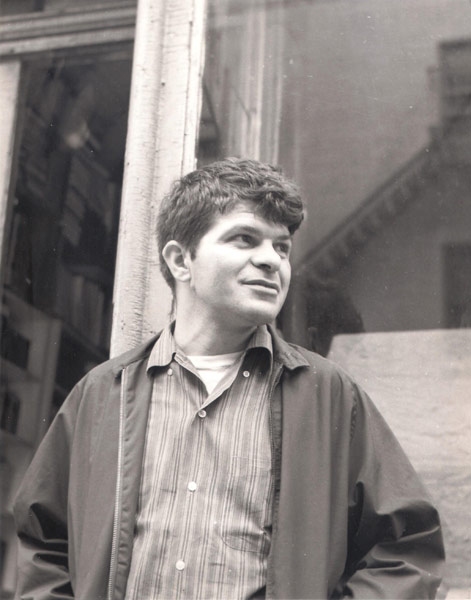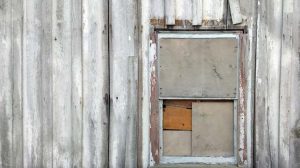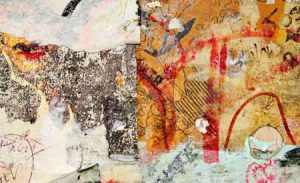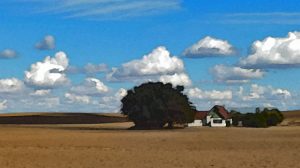
In a life of wide and restless travels, Gregory Corso produced six collections of poetry, together with a handful of plays and a novel, but left trailing in the wake of his urgent journeys an unknown number of lost poems. In interviews, Corso has recounted the sad loss of a suitcase full of his early poems in a Greyhound Bus terminal in Florida during the mid 1950s.1 He has also lamented the theft of two suitcases of poems – four years work – left in the care of the poet Isabella Gardner at the Hotel Chelsea in the mid 1970s.2 And he has regretted the sale to university libraries of his personal notebooks filled with unpublished poems: “When I needed money for dope, you see, I would never recopy the poems. I’d just sell the book. So a lot of my poems, you know, are in the universities and have never been published.”3 Other of Corso’s poems would seem simply to have been scattered behind him, mislaid and left unremembered in the rush of further poetic inspiration and precipitous departures to somewhere else. I believe that this latter explanation is likely the case as regards the three poems that I have excavated, so to speak, from a recording of a public reading of his poems given by Gregory Corso at the Poetry Center at San Francisco State College in October of 1956.4
Corso begins the 36-minute reading with nine poems selected from his collection, The Vestal Lady on Brattle (1955), then reads eight poems from a manuscript notebook titled “Poems Written in San Francisco, 1956.” Of these poems, four would later be gathered in Gasoline (1958), and one would be printed in The Happy Birthday of Death (1960.) The three fugitive poems embedded in the audio tape are “In the Madness of my Cellar,” “Creepy Flower Peddler,” and “Buddha.”5

Presented here below are my transcribed versions of these three hitherto unpublished poems. I cannot, of course, vouch either for punctuation, lineation or stanzaic patterns in the poems as I have rendered them here. Moreover, in the poem “Buddha,” despite repeated listening to Corso’s recitation on the audio tape, I am not fully confident as to my correct understanding of certain individual words. These include “peril,” “assayed,” “infant,” and “barium.” (Alternative suggestions concerning these words would be very welcome.) And let me take the opportunity here to express my gratitude to Raymond Foye for his gracious and invaluable help in correcting my transcriptions of the poems.
IN THE MADNESS OF MY CELLAR
I lost my God in the madness of my cellar.
I watched the janitor scorch a sacramental rat,
beat it against the pipe, rub hot pepper in its eyes.
No loves, no loves, in the madness of my cellar.
My baby brother leans against the hot furnace.
My father hangs red peppers to dry.
And my mad, mad mother giggles to the tarantella.
CREEPY FLOWER PEDDLER
He sells flowers and is a creep.
He sells flowers and wonders why he cannot sleep.
Unlike most peddlers, he grows his own,
and cuts them before they’re fully grown.
And here’s his nowhere song:
Little flowers without a stem.
Little flowers without a stem.
Three for a nickel, who wants them?
BUDDHA
A Harmonic Motion
For Jack Kerouac, Buddha-Fish
Buddha is dead.
Dead in the empty lot, in the fish box.
Dead without peril or theory.
Dead rehabilitated to dumb heroism.
A dead Buddha cannot view the pint wine bottle.
What does Buddha know of pushcarts?
With Buddha died his children, speechless, enamored by kind demons.
Sweet Buddha, where is he now?
Whose cowhorn is he sucking?
Buddha immortal mute suffering with mortal memories
has gone to the mountains below the mountains.
Strong solemn law inhabits Peril.
Peril is the demon.
He steals the angels of Buddha, puts salt on their wings,
handcuffs their brains to masculine limbs.
Who will talk to the demon?
Who will admire his new secondhand hearse?
Who will kiss his gnaw of eucharistic feet?
Lay their abundant blonde verse upon his gridiron?
Pluck wolfbane from his gargoyle-eyed, regnant skull?
Shoot a silver bullet into his dropping mouth?
Drive a maple stake into his reasonable heart?
Steal the soil of his native Transylvanian acreage?
Who will do this?
You will, children of Buddha.
You mad children of sodacaps.
You’ll stick nails in the tires of his hearse.
Sip gasoline from the tank of his hearse.
Put rocks in the watertank of his hearse.
O Buddha, marled and gnawed, aimless in America,
in secondhand hearse parked on Pine Street,
watching children of love play, and on their knees pray
God the Father of ice cream.
O Buddha, ghouled and gargoyled,
bugged and assayed in the pale arms of Mother Death Columbia.
Get thee beneath that pushcart and see it all.
See the broken glass and the bits of rope
that burst in on the radio wire.
Feel it, see it all Buddha!
Buddha is dead.
In death Buddha’s skin is wet yet shaky
like penguin does ice water, the beads of life,
owing everything to flash light, nothing to sunlight.
I know you, Buddha.
When you were born, really born,
you was Brooklyn 33, New York,
a Jewish section where everything was secret,
like shopping bags.
Your home was a street with ground windows and wide gray stoops,
with desiccant flowerpots and dry yellow curtains
– all this would obscure your infant mother’s twisted fate.
Bosatsu, now in motion.
Brother Bosatsu who teaches Buddha,
yet is engaged entirely in his own salvation.
Spit on Bosatsu!
Bosatsu who testifies the wisdom of Buddha and himself.
Spit on Bosatsu!
Bosatsu who strives to introduce and establish the ideal land.
Bosatsu who dares set down into the realm of agony.
Spit on Bosatsu!
Now, Buddha, now that you’re dead, what have you got to say?
The back legs of a goat.
The empty matchbox.
The sweet spray smell of insecticide
or the old barium in a cow’s hoof.
That’s what I’ve got to say.
”In the Madness of my Cellar” depicts the traumatic encounter of the poet-speaker with the cruelty and horror of the world, an experience that serves to undermine his religious faith and causes him to lament life in a realm without love. Appropriately, the events of the poem take place in a cellar, a hot, Hadean underworld, a realm of evil and pain. In addition to the poet-speaker who narrates the grim incidents recounted in the poem, the hellish cellar is inhabited by a sadistic janitor, an apparently indifferent father, an innocent, neglected, suffering “baby brother,” and a mother driven to madness (presumably by the cruel and loveless world to which, like the narrator, she is also a horrified, helpless witness.) “Cellar” and “tarantella” make an unusual and inventive rhymed pair lending a subtle lyrical unity to this vivid, potent poem. “In the Madness of my Cellar” resonates with motifs expressed in several poems in The Vestal Lady on Brattle in which terror and violence perpetrated upon innocent victims are prominent.
A similar theme informs “The Creepy Flower Peddler,” where the peddler in question cuts short the lives of young flowers, doing so for selfish commercial reasons. Already in the title of this poem, Corso affects a reversal of reader expectations. Traditionally, the trope of the flower seller is associated with innocence, as Eliza in G.B. Shaw’s Pygmalion and the figure of the blind flower girl in Charlie Chaplin’s classic film, City Lights.6 In Corso’s poem, however, the flower peddler is seen as a man callously restricting the full development of natural life, and the poet views him as malevolent and despicable, another embodiment of the brutish and unfeeling life-thwarting forces of the world, another destroyer of innocence. On the audio tape of the Poetry Center reading, after having read “The Creepy Flower Peddler,” Corso remarks “I believe flowers should be left to grow, let them grow and let them die where they are, we have no right to take these things away from the earth.” In this poem, the parallel constructions, repetitions, insistent metre, and emphatic rhymes seem to suggest the narrow limits of the flower peddler’s outlook.
In contrast to the taut structure of “The Creepy Flower Seller,” the poem titled “Buddha” capitalizes on the deep resources offered by free verse in combination with epiphanic leaps of imagination. In this elegy – both brash and reverent – the poet contrasts the demonic, destructive forces of the world with those agencies that resist such forces and whose aims are, instead, redemptive and liberating. Poverty, squalor, sterility and death clash in the poem with the teachings of “sweet Buddha,” and are defied by the sly, joyous sabotage undertaken by the “children of Buddha,” the “children of love.” Buddha’s insights are betrayed in this fallen world by hypocritical figures such as Brother Bosatsu (clearly undeserving of his misleading name) who seeks not the benefit and awakening of all sentient beings –as taught by Gautama Buddha – but only his own salvation. Yet, though “marled and gnawed … ghouled and gargoyled,” the spirit of Buddha somehow endures, reborn into the desiccated, spiritually claustrophobic contemporary world, and even in death remaining poetically eloquent, communicating through koan-like utterances. In Corso’s use of parallelism and refrain in the Brother Bosatsu stanza a faint echo may be detected of sections I and II of Allen Ginsberg’s poem, “Howl.”
Readers of Gregory Corso’s Gasoline will recall that in the “Introduction” to that volume Allen Ginsberg quotes with approval a line from an unpublished poem by Corso: “mad children of soda caps.”7 At last, we know the source of that line: the phrase occurs in “Buddha.” Similarly, readers of Jack Kerouac’s Desolation Angels may remember that in that novel the poet Raphael Urso (the author’s pseudonym for Gregory Corso) recites to the narrator via telephone his latest poem which includes the line: “Spit on Bosatsu! Spit on Bosatsu!”8 Again, the source is to be found in the same unpublished poem, “Buddha.”
I think it probable that the three lost poems printed above – together with others written during the same period – were not discarded by Corso but were intended to appear in a collection to be titled Early Poems which was to be published in 1960 by the Totem Press. In a letter written from Paris in November of 1958 to Allen Ginsberg, Corso mentions that LeRoi Jones (of Totem Press) wants to publish a book of his early poems and specifically names “Creepy Flower Peddler” as being among the poems to be gathered in that volume. A collection titled Early Poems is listed as forthcoming from Totem Press in the bibliography for Gregory Corso included in The New American Poetry 1945-1960 and is also mentioned in the bibliography for “Five Poets in their Skins,” an article by Paul Carroll in Big Table. For unknown reasons (most likely economic in nature) the book never appeared. We can only speculate as to what may have become of the manuscript of this intriguing collection.
The recovery of the three lost poems from 1956 transcribed above serves to extend and deepen our understanding of Gregory Corso’s work during the period between the publication of The Vestal Lady on Brattle in 1955 and Gasoline in 1958, and to remind us that further examples of Corso’s rich, visionary, quirky early poems may yet be retrieved from manuscript notebooks and other sources.
Notes
1 ”They were lost in a suit case at Hollywood, Florida … in the Greyhound Bus Terminal. And, Hope, my girlfriend – she went to all the Greyhound presidents to get the things back.” Gregory Corso interviewed in 1974 by Robert King, “I’m Poor Simple Human Bones,” in The Whole Shot: Collected Interviews with Gregory Corso, ed. by Rick Shober (2015) p. 108. See also letter from Gregory Corso “To Mr. and Mrs. Randall Jarrell” November 14, 1956, in An Accidental Autobiography: The Selected Letters of Gregory Corso (2002), p. 16.
2 “So there was a big gap – 1970-1974 – four years work gone.” Gregory Corso interviewed by Gavin Saleri in The Riverside Interviews: Gregory Corso, (1982) p. 32. See also “The Enigmatic Relationship of Poets Isabella Gardner and Gregory Corso” by Marian Janssen, The Journal of Beat Studies, Vol. 3, January 1, 2014, pp. 93-118.
3 “When I needed money for dope …” Gregory Corso interviewed in 1974 by Robert King, op.cit p. 102.
4 Magnetic tape audio recording of “Gregory Corso: October 21, 1956.” Poetry Center Digital Archive. <https://diva.sfsu.edu/collections/poetrycenter/bundles/191185>
5 From The Vestal Lady on Brattle: “Dementia in an African Apartment House,” “Greenwich Village Suicide,” “Coney Island,” “In the Morgue,” “Sea Chanty,” “Vision Epizooic,” “In the Early Morning,” and “Requiem for Bird Parker, Musician.” From Gasoline: “Mad Yak,” “On my 26th Year” (aka “I am 25”), “Italian Extravaganza,” “The Table was Hard Possible Music like Steel” (aka “This Was my Meal.) And from The Happy Birthday of Death: an early version of “Power.”
6 City Lights, film written and directed by and starring Charlie Chaplin, 1931. Pygmalion, play by George Bernard Shaw, 1913.
7 “Introduction” by Allen Ginsberg in Gasoline by Gregory Corso (San Francisco: City Lights, 1958) p. 7.
8 Desolation Angels by Jack Kerouac (New York: Coward-McCann, 1965) p. 128.
9 An Accidental Autobiography: The Selected Letters of Gregory Corso edited by Bill Morgan (New York: New Directions, 2003) p. 184.
10 The New American Poetry 1945-1960 edited by Donald M. Allen (New York: Grove Press, 1960) p. 447. “Five Poets in their Skins” by Paul Carroll, Big Table Vol. 1, No. 4, Spring 1960, p. 140.
COPYRIGHTS
“In the Madness of my Cellar” (1956) © 2020, The Estate of Gregory Corso, Sherri Langermann Baird, Executor.
“Creepy Flower Peddler” (1956) © 2020, The Estate of Gregory Corso, Sherri Langermann Baird, Executor.
“Buddha” (1956) © 2020, The Estate of Gregory Corso, Sherri Langermann Baird, Executor.




Robert Hogg says
Great job, Gregory Stephenson. Thanks for rendering these poems for us. It wd be nice if EM cd be allowed to reproduce the tape online so we cd hear the originals. May I suggest an alternate reading for one stanza of the Buddha poem. You transcribe it thus:
Buddha is dead.
In death Buddha’s skin is wet yet shaky
like penguin does ice water, the beads of life,
owing everything to flash light, nothing to sunlight.
I’m pretty sure Corso wd have meant in lines 3 – 4:
‘like penguin dust eyes water the beads of life
owing everything to flashlight, nothing to sunlight.”
I take my cue for this from his poem, Marriage, where he writes:
“And when the milkman comes leave him a note in the bottle
Penguin dust, bring me penguin dust, I want penguin dust-”
This cd of course be followed by ‘ice water” but listen close to see if it might be otherwise. As for “flashlight” as a single word, it is a rather surreal apposite to “sunlight” and wd be typical of Corso, again.
Denise says
The audio of Corso’s reading is linked from the essay, but is maybe not obvious enough. Thanks for pointing it out — I’ll see what I can do about that.
Heres’ the direct link to the recording:
https://diva.sfsu.edu/collections/poetrycenter/bundles/191185
Gregory K. Stephenson says
Sorry to be so long in replying. I just now read your comments. Excellent suggestions! Many thanks, indeed! And all good wishes to you, Gregory
Clara B Jones says
Gregory Stephenson: …thank you for taking the time to compose this important document…it is one of the most interesting essays i have read about a poet in a very long time…you have, perhaps, initiated a “recovery project” of Corso’s work…sincerely, clara b. jones
Gregory K. Stephenson says
Thank you so very much, Clara! All my particles accelerate to have such praise. Every best wish to you, Gregory